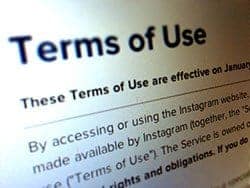Nobody gets excited about Website Terms of Use, but if you run a website, you NEED them.
In this comprehensive guide, I’ll cover:
- What are Website Terms of Use?
- Why do you need them?
- Where should you publish them?
- Lots more
So if you want to tick Website Terms of Use off your list and protect your website, you’ll love this guide. ✅
Let’s dive right in.

What are Website Terms of Use?
Website Terms of Use are the rules people must follow when they use your website.
They are designed to protect your website and your copyright.
Pretty boring stuff, right?
Absolutely!
Nevertheless, if you run a website, you’re going to need this legal notice on your site.
Website Terms of Use govern how website visitors can and can’t use your website (such as post comments or share your content).
They include a Website Disclaimer to limit your liability for any loss incurred by someone relying on your website’s information.
Website Terms also include Intellectual Property protection to prevent people from copying your content without your permission.

What do they include?
There are a number of important sections or ‘clauses’ included in Website Terms of Use.
We’ll cover each of them below:
★ Permitted Use – rules for using the website, including what’s allowed and what is prohibited. Common restrictions include any unlawful activity, defamatory or offensive comments and any unauthorised changes/interruptions to the website.
★ Intellectual property – this covers all of the content on your website, including written text, graphics, images, logos and video. Websites often place restrictions on sharing or copying their content to protect their copyright and ownership of original content.
★ Submissions – any rules around user submissions or comments, including your right to moderate or delete submissions that are against the rules.
★ Links – any rules around linking to/from your website, including a disclaimer about links to any external sites (which are outside your control).
★ Privacy – it’s standard practice to include a clause confirming that you take privacy seriously and provide a link to your Privacy Policy.
★ Security – how you protect the website’s security, such as SSL. Note that you do your best to ensure the website is free of bugs, malware, viruses etc.,
★ Disclaimer and indemnity – an essential clause to limit your liability for any loss or damage suffered by someone who relies on the information on the website. SUPER IMPORTANT!!!!
★ Changes to Terms – how you will notify of any changes
★ Severance – this is an important legal clause. It basically means that if any of your terms are found to be void or unenforceable in court, the others will remain in force.
★ Termination – when you can terminate the agreement
★ Jurisdiction – it’s important to confirm the governing law or jurisdiction where your website operates (state, territory or country).

Why You Need Them
OK, if you skip the rest of this article, make sure you still read this part…
There are three important reasons why EVERY website should have Website Terms of Use:
1. Limit your liability
Protect your business against claims or damages if a website visitor ever decides to take you to court.
2. Protect your Intellectual Property
Stop people from copying your content!
3. Keep control of YOUR website
Make sure you can moderate what happens on your website, how people interact with it and what is allowed.

Where should I publish my Website Terms of Use?
It is common practice to place a link to your privacy policy and Website Terms of Use in the footer of the website.
This makes it easy for website visitors to find the information if they need it.

Do people actually read Website Terms of Use?
Many people don’t, but you still need them anyway!
Think of it like an insurance policy for your website…
You’ll probably never need it, but if something ever does go wrong, you want to make sure you are covered.
It’s impossible to predict when this might be in the future, so the easiest thing to do is to get it right from the start, so you don’t have to worry about it!

Conclusion
Every website needs to publish Website Terms of Use.
As a website owner, you want to limit your liability, protect your intellectual property and maintain control of your website content.
This is how you do it!


